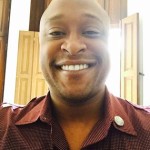After the last week’s podcast about the protests in Baltimore, Corey deVos, editor of Integral Life, put us in touch with a friend who lives there. “He’s an integral practitioner, a former member of the Black Panther party, a Buddhist meditation teacher and a therapist.” Do you want to talk to him? Um … yes!
It seems like the people making most of the noise—the protesters and the pundits—are the either/or voices, trying to blame or exonerate. So Jeff was excited to talk to someone with an integral perspective on the African American experience at a time when the conversation is so ripe.
…if we somehow can turn our attention towards our internal worlds, then we’ll find the strength to stand up in the face of injustice, and stand up in the face of the injustices that we commit against ourselves. ~Justin Miles
 Justin Miles shared a piece on Facebook that he called “Meditation for Militants” which stands out as an integral voice, calling not only for a look at the economic, political and social systems (the exteriors) but equally important, self-reflection among a community that feels so much anger that it can turn on itself.
Justin Miles shared a piece on Facebook that he called “Meditation for Militants” which stands out as an integral voice, calling not only for a look at the economic, political and social systems (the exteriors) but equally important, self-reflection among a community that feels so much anger that it can turn on itself.
While some voices insist they should use that rage and bring down the system, others assert that “violence is not the answer.”
As John Paul Brammer wrote this week in Blue Nation Review, the protests in Baltimore are “not a random, unprovoked outburst by a group of opportunists. This is how the unheard speak when words prove to be useless.”
Indeed, anger has a lot of energy in it. That is why, from a tantric perspective, it can be useful—but only if you have the anger, and the anger doesn’t have you. Justin tells Jeff:
“I think care and concern are a part of the nature of anger. They’re part of the usefulness of anger, wanting to go out and expand this feeling of wanting to improve things in Baltimore city.
“The other side of that, I think, the part that maybe we’re not seeing, is the aspect of needing the anger in order to go beyond the anger. We don’t need to see anger as something that’s not useful or something that somehow we feel bad about. I say…let’s go with it. Let’s use that as our fuel.”
To be effective, an activist needs to know his own mind and heart. Otherwise he will not be able to tell the difference between his own demons and the injustices inflicted upon him by a system that is uncaring, and he will burn everything indiscriminately.
This is where contemplative practice comes in. When you take a step back and look within, says Justin, “what is discovered is clarity, strength and mental stability, qualities that all revolutions are based on at their core. The ideas of social movements arise out of deep concern and connection with our heartmind.”
Justin’s big heart really comes through in this conversation, and we hope to have him back on the show.
Also in the podcast, Jeff looks at cynicism, and the role it plays in our political discourse. The integral perspective provides some relief from this tiresome outlook. Being aware of the fourth dimension (time) and taking multiple perspectives, “we become essentially post ideological. We become friends with life as it is, the world as it is, and we’re no longer comparing the world as it is unfavorably to some ideal…”
And lastly, questions from listeners: Mark in Tennessee is wondering about the ontological reality of visions, and Suzanne from North Carolina is questioning the legitimacy of astrology in light of her integral awakening.
Podcast: Download
Subscribe: Google Podcasts | RSS





